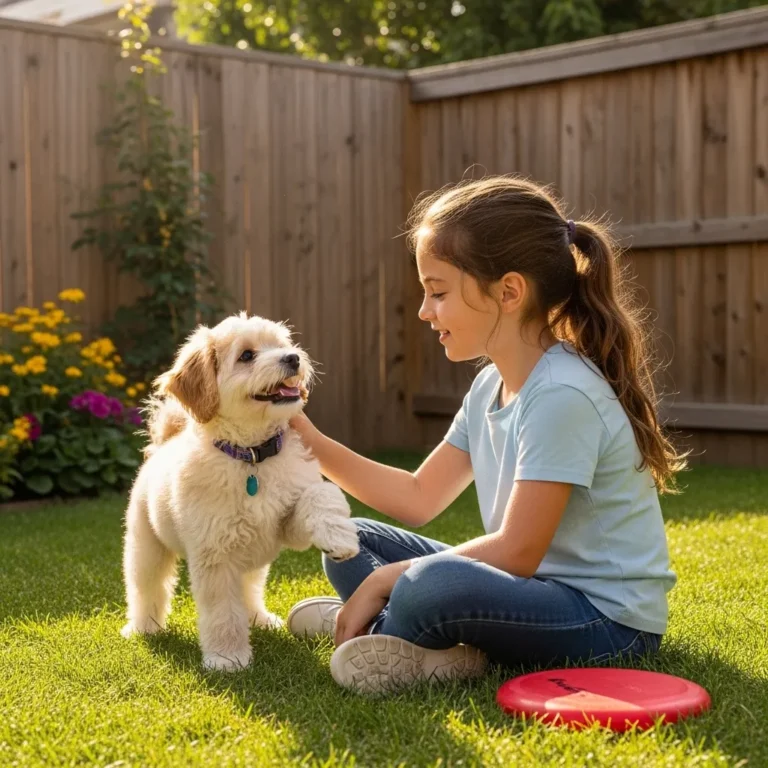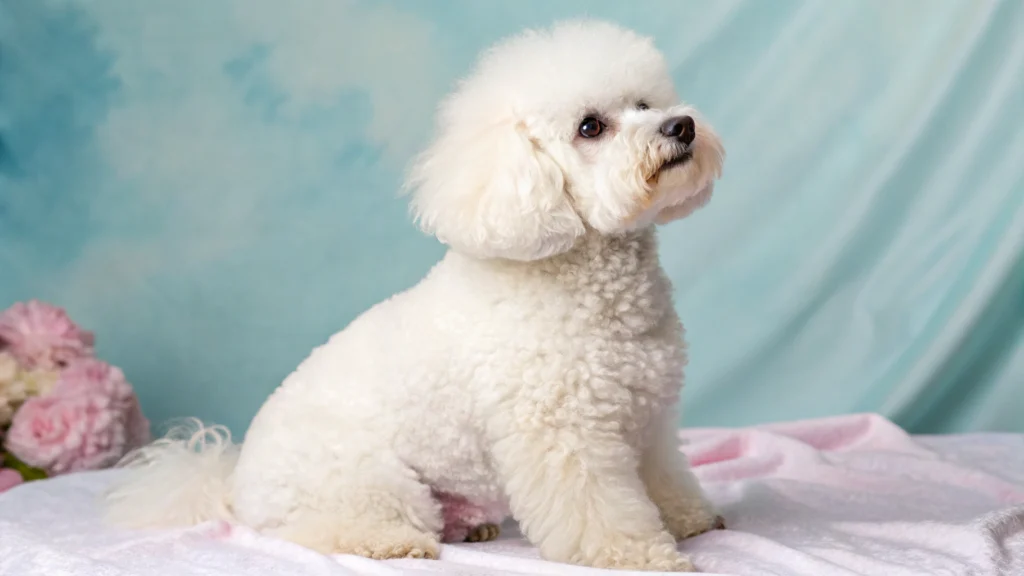
Author: DogsBlogSS Team
⚠️ Disclaimer: This article is for informational purposes only and is not a substitute for consulting a veterinarian.
If you’ve ever found yourself browsing adorable dog photos online, you’ve probably come across those fluffy, curly-haired, teddy-bear-looking pups and wondered: “What are they?” Many of them are what we call a poodle mix — that is, a dog whose parentage includes a poodle. Whether you’re considering bringing one into your home or just curious, understanding exactly what a poodle mix is (and isn’t) can help you decide if they’re right for you and your family.
What is a Poodle mix?
According to ellevetsciences: A “poodle mix” is simply a dog that’s been bred by crossing a poodle (whether the Standard, Miniature or Toy variety) with another breed. The goal is usually to combine the intelligence, temperament or coat characteristics of the poodle with desirable traits from the other parent breed. According to a vet-guide on poodle-mixed dogs, these crosses are increasingly common and go by names like “doodle” dogs or “oodle” dogs.
According to petscare: For example, a Goldendoodle (Golden Retriever × Poodle) or a Labradoodle (Labrador × Poodle) are well-known poodle mixes. According to the site PetsCare, “the most popular poodle mixes include Goldendoodles, Labradoodles and Bernedoodles.” One thing to keep in mind: a poodle mix is not the same as a purebred poodle — it’s a mixed breed by definition.
Are Poodle mixes considered purebred or mixed breed?
Since a poodle mix involves at least two different breeds, they are mixed-breed dogs — not purebred. Some breeders or owners may refer to them as “designer crossbreeds,” but the key is: they don’t meet the pedigree standards of a purebred breed (unless the mix is recognized and stabilized, which is rare).
A study from the Royal Veterinary College (RVC) found that the health of designer crossbreeds (including poodle mixes) is largely not better than that of their purebred parent breeds.
According to Royal Veterinary College,:In fact, for 86.6% of the disorder comparisons studied, the mix had the same risk as a purebred. So, while poodle mixes can combine positive traits, they are still mixed-breed dogs — and deserve the same careful considerations when choosing or caring for them.
What are the most popular Poodle mixes?
There are many poodle mix combinations out there, but some of the favourites include:
- According to wikipedia: Goldendoodle (Golden Retriever × Poodle) — a classic.
- According to wopet: Labradoodle (Labrador × Poodle) — friendly, energetic and popular with families.
- According to vetslovepets: Bernedoodle (Bernese Mountain Dog × Poodle) — larger size, often gentle and good with kids.
- According to ellevetsciences: Cockapoo (Cocker Spaniel × Poodle) — small to medium size, longtime beloved crossbreed.
- According to PetMD: Aussiedoodle (Australian Shepherd × Poodle) — high-energy, distinctive coat/colour patterns.
Of course, there are many more — smaller mixes (Toy/ Mini Poodle × other breed) and region-specific crosses too.
Do all Poodle mixes look alike?
Not at all — in fact, that’s part of their charm. Because one parent is a poodle (which can be Standard, Miniature or Toy) and the other parent varies widely, the offspring can inherit many combinations of size, coat texture, colour, ear-shape and facial features.
For example: some might have the tight curly coat of the poodle, others may have a wavy or even straighter coat from the non-poodle parent. Some will shed very little, others more so.
According to petscare: The coat type affects grooming needs, shedding, and appearance. According to an expert guide: “Coat characteristics of poodle mixes can vary significantly … most feature wavy to curly hair that requires regular maintenance.” So you cannot assume that every poodle mix will look teddy-bear-fluffy or hypoallergenic. There’s variety.
How big do Poodle mixes get?
Size depends primarily on two things: (1) which size of poodle was used (Toy, Miniature or Standard) and (2) the size of the non-poodle parent.
For example, a Toy Poodle crossed with a small breed will result in a small dog; a Standard Poodle crossed with a large breed (like Bernese Mountain Dog) can produce a large dog, possibly 60-90+ lbs.
According to ellevetsciences: In the guide from ElleVet: most doodle mixes weigh around 30–60 lbs and range in height about 1.5-2.5 feet, but this is very much a “ballpark”. Therefore, when selecting a poodle mix, you’ll want to ask the breeder (or rescue) about the likely adult size, parent sizes and growth chart.
What is the lifespan of a Poodle mix?
According to petplan: Lifespan can vary, again depending on size and parent breeds. But many poodle mixes enjoy relatively long lives compared to some purebred heavy breeds. For example, the standard poodle is often listed with a lifespan of around 12-15 years. For poodle mixes, smaller sizes often live longer (12-17+ years), while larger mixes may be in the 10-14 year range depending on health, care and genetics.
According to greencrossvets: The Cavoodle (Cavalier × Poodle) for example is given a lifespan of 10-14 years in one guide.
Good care, nutrition, exercise and regular vet check-ups all help extend healthy years.
Temperament & Personality
Getting a dog isn’t just about looks — it’s about how they act, how they interact with your life, with your kids, other pets, and how much you’ll love them. A poodle mix often offers an appealing mix of traits — but there’s no guarantee. Let’s explore.
What is the typical temperament of a Poodle mix?
According to petscare: Thanks to the poodle parent, many poodle mixes are known for intelligence, affection and a desire to please. The guide from PetsCare says: “Poodle mixes typically inherit high intelligence from their Poodle parent, making them highly trainable but sometimes stubborn. They often display a wonderful blend of both parent breeds’ personalities.”
According to lyka: In a blog article, they’re described as “highly social dogs with gregarious personalities and love family activities.”
According to poodlepethub: In short: they can be sweet, friendly, eager to learn, and love being part of the family. On the flip side: their intelligence means they can get bored easily, and if bored they may develop mischief or unwanted behaviours.
As one grooming-expert article warned about poodle-type dogs: they can become anxious if understimulated.
So the typical temperament is a big plus — provided you match the dog’s energy and brain needs.
Are Poodle mixes good with children and other pets?
According to akc: For many families, this is a key question. The answer: yes — many poodle mixes do very well with children and other pets — but it depends on socialisation, size of the dog (large dog + small child = more caution) and the individual dog’s personality and training.
The Standard Poodle breed profile from the American Kennel Club (AKC) says poodles are affectionate, good with young children and good with other dogs.
Given that poodle mixes often carry those traits, you’ll find many that are excellent with kids. But keep in mind: if the mix involves a high-energy parent breed (say, Australian Shepherd) then you’ll want to supervise interactions and ensure the dog has outlet for activity.
In short: yes, with training, socialisation and matching energy levels, a poodle mix can be a family-friendly pet.
Are Poodle mixes intelligent?
According to petplan: Absolutely — one of the major draws of the poodle in any cross-breed is its high intelligence. Poodles are consistently ranked among the smartest dog breeds.
According to petscare: When crossed, many poodle mixes retain strong learning ability, adaptability, and responsiveness to training. The PetsCare guide notes the high trainability of poodle mixes.
That means they’re great at learning commands, tricks, and participating in activities — but the flip side is they can become bored if not given mental stimulation or tasks. So a dog that sits idle for long may act out or find its own entertainment (which might not be what you want!).
Do Poodle mixes bark a lot?
According to petplan: Here’s where reality shows up: because many poodle mixes are alert, intelligent and socially oriented, they may bark more than a laid-back, low-energy breed — especially if they are bored, under-exercised or not properly trained. According to the PetPlan breed profile for poodles: “Their tendency … to be wary of strangers and a strong territorial instinct means they can often bark at visitors.”
So yes, some poodle mixes bark more than other breeds, but much of this comes down to how they’re raised, trained and whether their energy is being channeled. Good early training, neighbor-friendly rules, plenty of stimulation and boredom prevention can keep the barking in check.
Are Poodle mixes easy to train?
According to poodlepethub: In general: yes, they are easier to train than many dog breeds — provided you take advantage of their intelligence, give them consistent training, and make it fun. Because of their poodle heritage, they pick up commands, adapt to routines and often crave the interaction.
One grooming/trainer article on poodle behaviour emphasizes using positive reinforcement, early socialisation and keeping training engaging.
However, remember that “easy” doesn’t mean “zero work.” A poodle mix still needs socialisation, consistency, clarity, and the training should continue throughout the dog’s life. If you slack off, that intelligence may lead to resistance or independent behaviour.
In short: yes — compared to many breeds, easier — but not “set-and-forget.”
Grooming & Health
Now let’s talk about maintaining this wonderful companion: grooming, health care, exercise, diet — all the things that keep a poodle mix happy and healthy.
Are Poodle mixes hypoallergenic?
According to ellevetsciences: One of the big selling points of poodle mixes is that they’re often marketed as hypoallergenic — meaning they shed less and release fewer allergens into the environment. And yes, many do inherit low-shedding coats from the poodle parent. For example: an article on doodle dogs states that because many poodle mixes inherit wavy/curly coats and tend to shed less, they are a “perfect (and many times, the only) choice” for owners who have allergies.
According to Royal Veterinary College: But caution: no dog breed is 100% hypoallergenic. Allergies are complex (pet dander, saliva, urine etc). And the non-poodle parent’s genetics matter. The RVC study quoted earlier (from 2024) found that designer poodle-cross dogs did not have significantly better health or allergen profiles than their parents — meaning you shouldn’t assume “doodle = definitely no shedding or no allergens”.
Bottom line: yes, poodle mixes may often shed less and be a better fit for allergy-sensitive households, but you should still meet a dog in person (in your home environment), test for your own allergens, and be realistic.
Do Poodle mixes shed?
Shedding depends on coat type. Many poodle mixes have wavy or curly coats that trap hair and shed minimally — but some inherit straighter coats from the non-poodle parent and thus shed more. According to the “Doodle Dogs 101” guide:
- Curly coats → lowest shedding, highest grooming demands
- Wavy coats → moderate shedding, moderate grooming
- According to askavet: Straight coats → more shedding, less grooming effort toward mats.
Therefore: you can’t assume all poodle mixes are “no‐shedding”. Choose based on the individual dog’s coat type, and be prepared accordingly.
How often do Poodle mixes need grooming?
Because of the often-curly or dense coats many inherit, grooming is more than brushing once and being done. According to a grooming article: professional grooming for doodle/poodle mixes should be every 6-8 weeks, with brushing at home every 1-2 days to prevent painful matting. According to Ask A Vet+1
According to vetslovepets: Another source says: for poodles (and thus the poodle parent side), daily or every-other-day brushing and grooming every 4-6 weeks is advised.
So for a poodle mix: expect a commitment. If you don’t want to brush frequently, detangle or go to a groomer often, you may find the experience more demanding than anticipated.
What are common health issues in Poodle mixes?
According to Royal Veterinary College: Because they’re a mixed breed, a poodle mix can inherit health conditions from either parent. The key is: you must be aware of potential risks and work with a reputable breeder or rescue.
The RVC study found that of 57 common disorders evaluated, poodle mixes had similar health risks as their parent breeds in most cases (86.6%).
According to trupanion: Some conditions to watch for in poodle mixes (and poodles generally) include: hip dysplasia, ear infections (especially floppy ears), vision problems like PRA (progressive retinal atrophy), and dental disease (especially in small dogs) among others.
So the takeaway: a poodle mix doesn’t guarantee “fewer problems”. You still need to ask about health testing, parent screening, and realistic expectations.
How much exercise does a Poodle mix need?
According to petscare: Many poodle mixes are energetic — thanks to the poodle parent (which was a working/retriever breed originally) plus whatever traits they got from the other parent. According to PetsCare: “Most poodle mixes are energetic dogs requiring both physical exercise and mental stimulation. Daily activities should include 30-60 minutes of active exercise, interactive play sessions and training or puzzle games for mental enrichment.”
For smaller mixes, the 30-60 minute range is typical; for larger Standard-size mixes or those with herding/retriever lineage, you may need more space, outdoor time, and purposeful activity.
So: factor in your lifestyle, energy level, and whether you can commit to walks, play, mental games, and outings.
What is the best diet for a Poodle mix?
According to justanswer: You’ll want a high-quality, well-balanced diet that fits your dog’s life stage (puppy, adult, senior), size (toy/small vs large), and activity level. For poodle mixes, because they may be prone to joint issues (in larger versions) or dental/weight issues (in smaller ones), diet matters.
A guideline from JustAnswer about mixed poodle puppies: “Mixed poodles may face digestive sensitivities and skin allergies requiring careful diet management.”
So: choose premium dog food, avoid excessive fillers, ensure good protein and essential nutrients, monitor weight (not too heavy, not too light), and discuss with your vet for size- and age-specific needs. Also: portion control, treat moderation, and monitoring body condition are essential.
Choosing & Caring for a Poodle Mix
So you’ve decided you’re interested in a poodle mix. Great! But there are important questions and decisions to make. Let’s walk you through the practical parts: cost, sourcing, choosing, supplies, and whether this breed suits you.
How much do Poodle mixes cost?
According to dogster: Costs vary widely depending on size, rarity of coat colour, health testing, heritage of breeder, and region. According to a pricing guide: adoption fees may be $70-$800 for less sought-after dogs, while breeders may charge $400-$2,500+ for a poodle (hybrid prices can be similar or higher).
According to abcspuppyzs: Another source: poodle mix hybrids from reputable breeders often range in the region of US$1,000-$3,000+.
And remember: that’s just the upfront puppy cost. Ongoing costs (grooming, diet, vet care, training, supplies) will add up.
If cost is a major factor, also consider rescue/adoption options.
Where can I find a Poodle mix for adoption or purchase?
Adoption/rescue: Many shelters and rescues have poodle mixes or mixed-breed dogs including poodle crosses. Sites like Chewy list adoptable poodle/mixed dogs. According to Chewy Some breed-specific rescues focus on poodle crosses.
Purchase from breeder: If you go this route, look for a breeder who:
- provides health clearances for both parents
- allows you to meet the dogs (parents and puppies)
- has good care, socialisation, and transparency
- doesn’t over-promise “hypoallergenic” etc without explaining caveats
According to Royal Veterinary College: As the RVC research warns: just because a dog is a designer cross doesn’t mean automatically “healthier” or “better.”
Important: Wherever you get your dog, take time, ask questions, check for early socialisation and screening, and don’t rush the decision.
What should I look for when choosing a Poodle mix puppy?
Here are some important points:
- Parent sizes and breed: Know what size the poodle was (Toy/Mini/Standard) and the other parent. Estimate adult size.
- Coat type: Check whether the coat is curly, wavy or straight — gives you a clue about shedding and grooming demands.
- Health testing & history: Ask for health screenings of parents (hips, eyes, joints, etc).
- Temperament: Watch how the puppies behave. Are they confident, curious, calm-active? Avoid extreme fear or aggression even as pups.
- Breeder practices: Are the puppies raised in home/family environment? Are they socialised, exposed to typical household noises, kids, other pets?
- Commitment: Make sure your lifestyle matches the dog — time, space, grooming, activity.
- Contract & guarantees: Some good breeders provide contracts that include health guarantees or return clauses.
- Red flags: Lots of unsocialised pups, no access to parents, very cheap cost without screening, unavailable health data.
What supplies do I need for a Poodle mix?
Here’s a checklist of essentials (and some nice-to-haves):
✅ Quality dog bed (appropriate size)
✅ Harness + leash (start with gentle training)
✅ Food and water bowls (stainless or ceramic preferred)
✅ High-quality dog food (age and size appropriate)
✅ Grooming supplies: slicker brush, comb, detangling spray, nail clippers, dog shampoo (sensitive skin if applicable)
✅ Crate or safe zone (for training and downtime)
✅ Toys for mental stimulation (puzzle toys, treat toys)
✅ ID tags + microchip (if not already)
✅ Training treats + clicker or marker system (if you train)
✅ Health care plan: vet check-ups, vaccinations, parasite control
✅ Groomer schedule (if you’re using professional grooming)
✅ First-aid kit or basic dog healthcare supplies
Depending on the size and coat of your poodle mix, you might also need equipment like a grooming table (if you plan to handle grooming at home), sturdy outdoor play equipment, or extra bedding if they’re a larger breed.
Is a Poodle mix the right dog for me?
Here are some honest questions to ask yourself:
- Do I have the time (daily) for exercise and mental stimulation? A poodle mix will often want more than a quick walk.
- Am I willing to commit to regular grooming (brushing, detangling, trips to groomer) or do I prefer a low-maintenance coat?
- Is my home size and environment suitable for the likely adult size of the dog (fenced yard, apartment, etc)?
- Do I want a dog that is very social and likely to be part of the family — or am I wanting a more low-key independent pet? Poodle mixes tend to want to be with you.
- Am I ok with the ongoing cost of vet care, grooming, high-quality food and supplies?
If you answered yes to most of these, then a poodle mix could be a wonderful companion for you. If not, consider other breeds or types of dogs.
As one vet-guide puts it: “Doodles can be amazing companions — but they aren’t low-effort pets.” According to Ask A Vet
In short: They have tremendous potential — but you’ll get the most joy if you’re prepared for the lifestyle that comes with them.
Final thoughts
A poodle mix brings together many of the traits dog-lovers value: intelligence, loyalty, cordiality, and (often) lower shedding. But they also come with the responsibilities of grooming, training, health care and lifestyle matching. You’ll want to treat your decision not just as “cute puppy” but as a long-term companion.
Ask lots of questions, meet parent dogs if possible, budget for the full cost (money + time), and most of all: choose a dog whose temperament and needs align with your home, energy and lifestyle. If you do, you’ll likely find a poodle mix that not only steals hearts — but becomes a cherished member of your family.
Notice : The DogsBlogSS editorial team is dedicated to providing accurate, research-based information about dog health, behavior, and care. All our articles are fact-checked using trusted veterinary sources such as VCA Hospitals, Merck Vet Manual, and the AKC.
you may like it






sources
- https://www.rvc.ac.uk/vetcompass/news/new-rvc-research-debunks-belief-that-designer-crossbreed-dogs-are-healthier-than-purebreds
- https://www.petmd.com/dog/care/doodle-dogs-101
- https://www.vetslovepets.com.au/blogs/dog/poodle-breed-guide
- https://www.marthastewart.com/7974587/poodle-mixes
- https://www.dogtime.com/reference/141716-popular-poodle-mixes-and-doodle-dogs
- https://www.rvc.ac.uk/vetcompass/news/peke-a-poo-boom-in-designer-dogs-creates-the-perfect-storm-for-animal-welfare-issues


